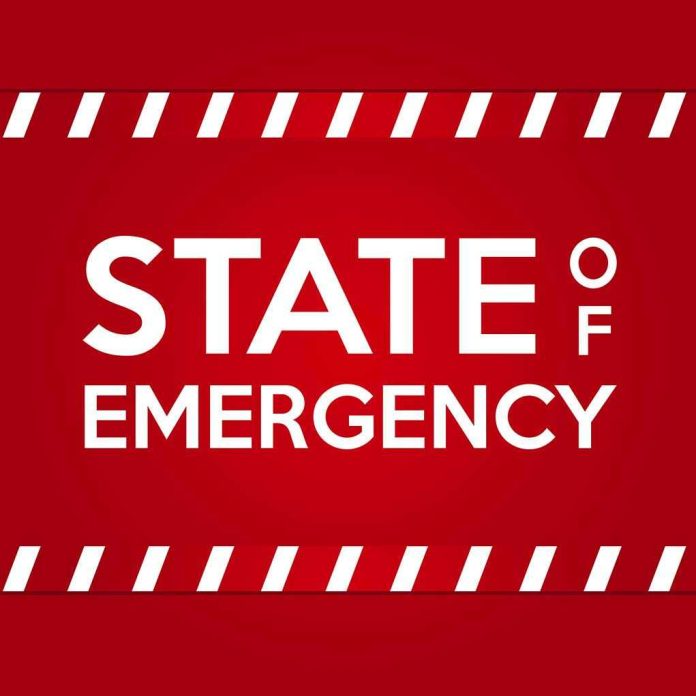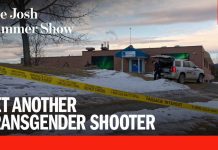
With a swipe of his pen, Virginia’s governor yanked 850,000 people from the jaws of a food crisis—blaming Washington’s chaos for a hunger emergency no state was ever meant to solve alone.
Story Snapshot
- Governor Glenn Youngkin declared a state of emergency on October 23, 2025, as a federal government shutdown threatened to cut off SNAP food benefits for over 854,000 Virginians starting November 1, 2025.
- Youngkin framed the crisis as a “Democrat Shutdown,” releasing state funds to backstop federal nutrition assistance while directly criticizing Congressional Democrats for the impasse.
- Food banks warn they cannot possibly fill the gap left by SNAP—for every meal they provide, SNAP delivers nine, exposing the charitable system’s limits.
- The shutdown, now in its fourth week, has no clear end in sight, raising urgent questions about how long Virginia’s stopgap will last and who ultimately pays the bill.
- This is not just a story about hunger—it’s a live case study in how federal dysfunction cascades into state emergencies, with real-time consequences for families, businesses, and the social safety net.
The Brink of a Hunger Cliff
On October 23, 2025, Virginia became the first state to declare a hunger emergency over a federal government shutdown, with Governor Glenn Youngkin authorizing state funds to replace SNAP benefits for more than 854,000 residents at risk of losing food assistance November 1. The move is unprecedented: SNAP is a federal program, administered by states but entirely funded by Washington. No governor has ever stepped in to backstop it during a shutdown—until now. Youngkin’s declaration is a political gambit as much as a humanitarian one, explicitly blaming Congressional Democrats for the crisis he calls the “Democrat Shutdown.”
The timeline is unforgiving. The federal government has been shuttered for 23 days, with no resolution in sight. On October 22, food bank leaders sounded the alarm: their systems are already stretched, and they cannot possibly absorb the demand if SNAP benefits stop. Eddie Oliver, head of Virginia’s food bank network, put it bluntly: “For every meal that food banks distribute, SNAP provides nine. There is simply no way that we can make up significant gaps or losses to that program.” This math reveals a chilling reality—charity alone cannot replace the scale and reliability of federal nutrition assistance.
Who Feels the Pain—and Where
The crisis touches every corner of Virginia, but some regions face especially acute risk. Central Virginia counts 172,000 SNAP recipients; Fairfax County, the state’s most populous jurisdiction, has 56,000. State Senator Danica Roem, representing Northern Virginia, warned that when SNAP benefits are cut, “the first thing people do is go to the food banks. And when the food banks are underfunded, we have people subsist on woefully inadequate meals.” The strain ripples beyond the kitchen table—grocery stores, food retailers, and local economies all feel the pinch when nearly a million people suddenly have less to spend.
The state’s emergency declaration is a fiscal leap into the unknown. Virginia now shoulders the cost of feeding hundreds of thousands, an expense never budgeted and with no guarantee of federal reimbursement. The exact price tag remains unclear, but the precedent is clear: when Washington gridlocks, states may be forced to pick up the tab—or let their citizens go hungry.
Political Theater Meets Human Need
Youngkin’s framing of the crisis as a “Democrat Shutdown” thrusts a humanitarian issue into the heart of the partisan divide. While the governor acts to protect Virginians, his rhetoric assigns clear blame to Congressional Democrats, a move that resonates with conservative audiences skeptical of federal overreach and eager for state-led solutions. Yet, the reality is more complex: government shutdowns are typically the result of failed negotiations between both parties, and no statements from federal Democrats or agency officials are included in available reporting to counter Youngkin’s narrative.
Youngkin declares state of emergency over ‘Democrat Shutdown’ depleting SNAP benefits for 850K Virginians https://t.co/gsepEDtBdm
— Fox News Politics (@foxnewspolitics) October 24, 2025
Democratic lawmakers and advocates focus on the human cost. US Rep. Jennifer McClellan organized advocacy calls highlighting the shutdown’s impact, while food bank directors like Nicholas Jenkins of Chesterfield Food Bank Outreach Center brace for a “sharp influx of need” as November approaches. The charitable sector, traditionally nonpartisan, finds itself on the front lines of a crisis not of its making, forced to bridge a gap no private organization was designed to fill.
Beyond Virginia: A Warning for the Nation
Virginia’s emergency is a preview of what could unfold nationwide if the shutdown drags on. The commonwealth’s response—though bold—is a stopgap, not a solution. It exposes the fragility of a system where federal nutrition assistance is the first, not the last, line of defense against hunger. When that line fails, the safety net unravels with alarming speed. The 9:1 ratio between SNAP and food bank meals is a national statistic, not just a Virginia one. If other states follow Virginia’s lead, the fiscal and logistical challenges will multiply.
The shutdown also raises uncomfortable questions about contingency planning. Why does a program as vital as SNAP lack robust backup funding? Why must governors improvise emergency responses to predictable federal failures? And what does it mean for American governance when essential services become bargaining chips in Washington’s budget wars? These are not academic questions—they are being answered in real time, in grocery lines and food pantries across Virginia.
The Road Ahead: Uncertainty and Hard Choices
As November 1 looms, Virginia’s food banks are surging resources to local pantries, but leaders admit they are “certainly not confident” they can meet the demand if SNAP benefits are interrupted. The state’s emergency funds will buy time, but not peace of mind. The longer the shutdown lasts, the greater the strain on Virginia’s budget and the higher the risk of missed meals, skipped medications, and deteriorating health for the most vulnerable.
This crisis is a stress test for federalism itself. It reveals both the limits of state power and the consequences of federal failure. For conservatives, it’s a case study in the virtues of local control and the perils of Washington dysfunction. For all Americans, it’s a stark reminder that political battles have real victims—and that hunger doesn’t pause for partisanship.
Sources:
VPM: SNAP, WIC food stamp funding in jeopardy as federal shutdown continues
Fairfax County Government: SNAP benefits may be impacted—what you need to know







